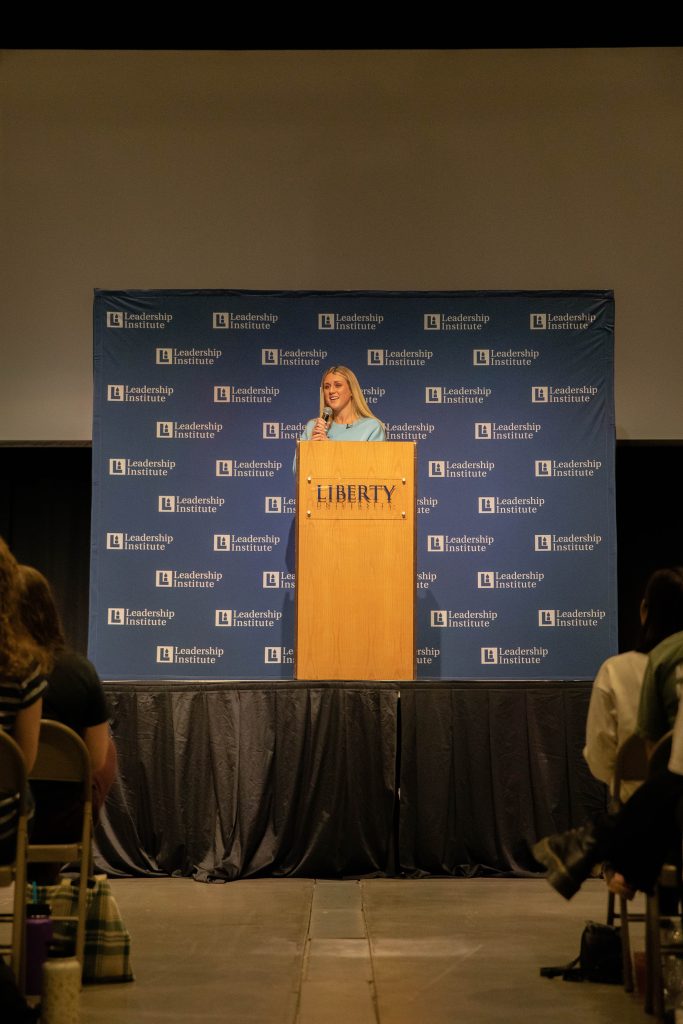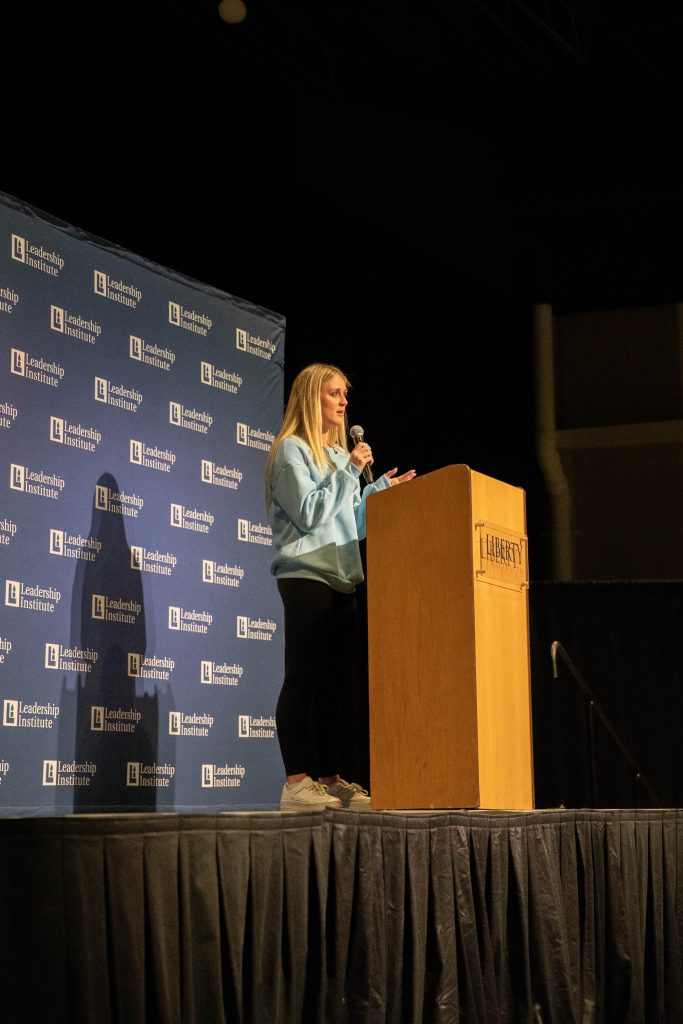Riley Gaines challenges the status quo by demanding fairness in women’s sports

Twelve-time All-American swimmer Riley Gaines made a splash when she became one of the first people to stand up and speak against the unfairness of transgender women competing in women’s sports. Liberty’s Life, Liberty and Pursuit of Truth club, sponsored by the Leadership Institute, hosted Gaines on Tuesday, April 11. Gaines spoke to hundreds of students and visitors about her experience in competing against Lia Thomas, a transgender woman (biological male), in the 2022 NCAA Women’s Swimming Championship.
Gaines recently graduated from the University of Kentucky, and though her original plan was to go to dental school and become a dentist, she has put that goal aside to focus on more pressing matters.
Her career plans were tossed out the window when she and dozens of other women were forced to share a locker room and compete against a biological male. Gaines now speaks across the country with the hope of making a change in the NCAA’s current system that allows men who identify as women to compete with actual women.
During one of her most recent college campus visits at San Francisco State University, Gaines was physically assaulted as many members and supporters of the LGBTQ+ community harassed her and tried to get her to pay for her safety. Even so, Gaines continues her activism.

Many events in the course of the 2022 NCAA Women’s Swimming Championship led Gaines to become a leader in the fight to protect women’s sports. The uncomfortable scenes in the locker room, where many women had to undress in front of the male swimmer, Lia Thomas, were only part of what tipped Gaines over the edge.
According to Gaines, an NCAA official told her that the facility made the locker rooms unisex to get around regulations so they could allow a male in the women’s space. Any man could have walked in there, and it would have been legal. No one warned Gaines about the arrangement.
“It felt like belittlement, and it felt like betrayal,” Gaines said.
In the same championship, Gaines tied with Thomas in the 200-meter race for fifth place. Since there was only one trophy for the placeholder and the competition didn’t account for ties, Thomas got the trophy for “photo purposes.” Gaines felt it was unfair for the award to go to someone who went from scoring “dead last” in the men’s division to dominating the women’s pool.
“That is when I realized I’d had enough,” Gaines said. “Up until this point, I was waiting for a coach, or another swimmer, or a parent, or someone with political power, or someone within the NCAA or someone who was supposed to be protecting us … to protect us. But then it really hit me. If we as female athletes weren’t willing to stick up for ourselves, how could we expect someone else to stick up for us?”
In some cases, Thomas actually beat out several women, causing some of them not to make All-American by just one rank. Gaines saw many of her fellow female swimmers cry at the unfairness of it all.
Unfortunately, many swimmers, coaches and athletic directors that Gaines has encountered refuse to speak out, not because they disagree with her, but because they fear the consequences. Gaines explained how many parents and coaches don’t say anything because they’re afraid of hurting their families or losing their jobs.
“The suppression of speech is a lot more chilling than the fairness of women’s sports. When we’re controlling what people can and can’t say, that’s pretty scary,” Gaines said. “(This movement) is a lot bigger than women’s sports.”
The issue at hand pervades more than women’s swimming. It affects all women’s sports and even goes beyond that.

Life, Liberty and Pursuit of Truth chose to host Gaines for that very reason. Katie Gooding, vice president of the club and campus ambassador for Leadership Institute, joined the club three years ago because she wanted to bring a biblical worldview into cultural issues. She believes that Christians and students can have too much “apathy” towards politics.
“We’ll talk about issues which we know are important to the Christian faith. However, people will say, ‘Oh it’s too political. We don’t want to talk about it,’ so our goal is really just to have this idea of ‘Hey, you can talk about the Bible, but you can also talk about politics. You can talk about culture,’” Gooding said. “If you’re not putting that biblical worldview into every single aspect … you’re not truly living out the gospel.”
For more information on Life, Liberty and the Pursuit of Truth, follow them on Instagram @lupursuitoftruth, and to support Rylie Gaines, visit her website.
Bear is the feature editor for the Liberty Champion

